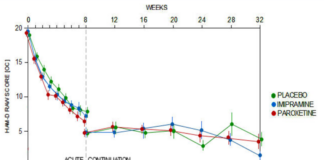Tag: negative effects of ssri
Irving Kirsch: The Placebo Effect and What It Tells Us About...
Dr Irving Kirsch is Associate Director of the Program in Placebo Studies and lecturer in medicine at the Harvard Medical School and Beth Israel Deaconess Medical Center. He joins us this week to discuss his research into the placebo effect and what it tells us about the efficacy of antidepressant drugs.
David Healy: Making Medicine Safer for All
Doctor David Healy from Bangor University in Wales talks about prescribing practice, medicine safety and pharmaceutical regulation.
Is Society or Psychiatry to Blame for the “Seriously Mentally Ill”...
Adults in the U.S. diagnosed with “serious mental illness” die on average 25 years earlier than others. This is not controversial, as establishment psychiatry and its critics agree. What is controversial is who is to blame?
Antidepressants Increase the Risk of Suicide and Violence at All Ages
Although the drug industry, our drug regulators and leading psychiatrists have done what they could to obscure these facts, it can no longer be doubted that antidepressants are dangerous and can cause suicide and homicide at any age.
What’s the Harm in Taking an Antidepressant?
We know that all drugs have side effects. That’s just part of the deal right? But is it really possible that an antidepressant can cause a sane person to act like a cold-blooded criminal?
Exploring Psychiatry’s “Black Hole”: The International Institute on Psychiatric Drug Withdrawal
When Carina Håkansson sent out an invitation for a symposium on "Pharmaceuticals: Risks and Alternatives," some of the world's top scientists, along with experts-by-experience, came from 13 countries to explore better ways to respond to people in crisis.
$11.9 Million Paxil Suicide Verdict: The Inside Story
The judicial system and the public are becoming increasingly aware of the hazards of psychiatric drugs, including their capacity to make people behave in ways that are harmful to themselves and others, and contrary to their past behavior and character.
Study 329 Taper Phase
Most doctors still affect surprise at the idea SSRIs might come with withdrawal problems. Regulators knew very clearly since 2002 about the problems, but have decided to leave any communication of these issues in company hands.
Study 329 Continuation Phase
All the fuss about Study 329 centers on its 8-week acute phase. But this study had a 24-week Continuation Phase that has never been published. Until Now.
Sadness: The Problem and The Solution
There is an ever-narrowing bandwidth of behavior that supports the dominant narrative in our culture today. We all need to act a certain way to protect the foundational beliefs of our time – that “science” has it all figured out, that rules keep us safe, and that it’s us vs. them (insert germs, terrorists, pests, and other “enemies”). But what are the consequences of this? What is this sadness and where does it go if we bandage our consciousness with business, medication, substances, or general avoidance of our real human experience?
Violence Caused by Antidepressants: An Update after Munich
The media is now reporting details about the 18-year-old who shot and killed nine and wounded many others before killing himself on July 22 in Munich. My clinical and forensic experience leads to a distinction among people who murder under the influence of psychiatric drugs. Those who kill only one or two people, or close family members, often have little or no history of mental disturbance and violent tendencies. The drug itself seems like the sole cause of the violent outburst. On the other hand, most of those who commit mass violence while taking psychiatric drugs often have a long history of mental disturbance and sometimes violence. For these people, the mental health system seems to have provoked increasing violence without recognizing the danger.
Rising Rates of Suicide: Are Pills the Problem?
If you’ve read recent reports that state “US suicide rates surge to a 30 year high,” you might first justify the reality with the fact that things feel very wrong in our world today. On a personal, national, and planetary level, people are suffering to survive and the distress is coming from all sides – medical to economic to existential. But you probably also wonder why more people are choosing this permanent and self-destructive path, and feel compelled to submit to seemingly logical appeals to provide these individuals more help and greater access to treatment. Surprise: that may be the last thing our population of hopeless and helpless needs. Life’s inevitable challenges are not the problem. It’s the drugs we use that are fueling suicide.
Moving Forward in the Science of Psychiatric Medication Discontinuation/Reduction
This week Live & Learn launched a research study on the experience of people labeled with mental disorders who have tried to stop taking psychiatric medications. This project -- the Psychiatric Medication Discontinuation/Reduction (PMDR) Study -- aims to understand the process of coming off psychiatric medications in order to better support those who choose to do so. The study seeks to answer the question: What helps people stop their psychiatric medications? What gets in the way of stopping?
Prescribing Antidepressants for Girls: Intergenerational Adverse Consequences
Children exposed to SSRIs during pregnancy, a recent study shows, were diagnosed with depression by age 14 at more than four times the rate of children whose mothers were diagnosed with a psychiatric disorder but did not take the medication. Such reports are usually met, appropriately, with an outpouring of reassurances from clinicians who take care of pregnant women, who need to protect their emotional wellbeing in whatever way they can. From my perspective as a pediatrician specializing in early childhood mental health our attention must be on prevention.
Who Will Guard the Guardians of Psychiatry?
The assertion that the so-called antidepressants are being over-prescribed implies that there is a correct and appropriate level of prescribing and that depression is a chronic illness (just like diabetes). It has been an integral part of psychiatry's message that although depression might have been triggered by an external event, it is essentially an illness residing within the person's neurochemistry. The issue is not whether people should or shouldn't take pills. The issue is psychiatry pushing these dangerous serotonin-disruptive chemicals on people, under the pretense that they have an illness.
The Evidence-Based Mind of Psychiatry on Display
The writings of Pies and his colleagues, I believe, provide a compelling case study of cognitive dissonance. Cognitive dissonance arises when people are presented with information that creates conflicted psychological states, challenging some belief they hold dear, and people typically resolve dissonant states by sifting through information in ways that protect their self-esteem and their financial interests. It is easy to see that process operating here.
A Worldwide Epidemic – The Misuse of Anti-Depressant Medications
Not all people who have letters after their names are actually "gods" or even people who have any special powers to know things about us more than we can learn about ourselves, about our own bodies, and our own minds. Blindly following what someone says we need to be doing for our own health (mental or physical) and well-being just because they have a white jacket on (so to speak) is usually not in our best interests.
Making the Case Against Antidepressants in Parliament
On Wednesday, May 11, there will be an inquiry by a work group in the U.K.’s Parliament into whether increases in the prescribing of antidepressants are fueling a marked increase in disability due to anxiety and depression in the U.K. I wrote about a similar rise in disability in the United States in Anatomy of an Epidemic, and the All Party Group for Prescribed Drug Dependence, which is the Parliamentary group that organized the debate, asked me to present the case against antidepressants.
Restoring Study 329: Letter to BMJ
When we set out to restore GSK’s misreported Study 329 of paroxetine for adolescent depression under the RIAT initiative, we had no idea of the magnitude of the task we were undertaking. After almost a year, we were relieved to finally complete a draft and submit it to the BMJ, who had earlier indicated an interest in publishing our restoration. But that was the beginning of another year of peer review that we believed went beyond enhancing our paper and became rather an interrogation of our honesty and integrity. Frankly, we were offended that our work was subject to such checks when papers submitted by pharmaceutical companies with fraud convictions are not.
The Psychiatry Sandcastle Continues to Crumble
Psychiatry would long since have gone the way of phrenology and mesmerism but for the financial support it receives from the pharmaceutical industry. But the truth has a way of trickling out. Here are five recent stories that buck the psychiatry-friendly stance that has characterized the mainstream media for at least the past 50 years.
Life, Unarmed
When I was born, everyone was expecting me to have arms. The doctor's mind raced; how am I going to tell this mother and the father that their son has hands but not arms? If he's missing so much in his extremities, mustn’t he also be missing a mind? My mom looked into my eyes and knew - in a way that only mothers know - that I had a mind, and spirit.
GSK to Face Class Action over Antidepressants for Children
A Sydney, Australia law firm has launched a class action on behalf of people who as children and adolescents were prescribed Glaxosmithkline's drug Paroxetine. Despite...
Antidepressant Made Germanwings Co-pilot “Panic”
Germanwings pilot Andreas Lubitz wrote, in a desperate, final email to his psychiatrist two weeks before slamming his A320 jet into the French Alps...
Further Evidence of the Adverse Effects of Antidepressants, and Why These...
When the idea that selective serotonin re-uptake inhibitors (SSRIs) might make people feel suicidal first started to be discussed, I admit I was sceptical. It didn’t seem to me the drugs had much effect at all, and I couldn’t understand how a chemical substance could produce a specific thought. Because these effects did not show up in randomised controlled trials, they were dismissed and few efforts were made to study them properly. Then some large meta-analyses started to find an association between the use of modern antidepressants and suicidal thoughts and actions, especially in children.
Why Screening Everyone for Depression is a Terrible Idea
Too many people have come to view themselves as defective and powerless to change their life situations, when this may not be the case. Conversely, individual treatment with drugs or psychotherapy may cause individuals to reframe their problems in terms of neurochemistry or thinking styles – internalizing a belief that they are the problem, when their problems exist in a wider sociopolitical milieu.



















